#zhongwen-lingblr
Explore tagged Tumblr posts
Text
Welcome to that Cultural Segment
With your host, Zhongwen-lingblr
Today we’ll be talking about Mulan, addressing some complaints about the up-coming movie, and introducing you to 500 AD Chinese Poetry.

Mulan is a verbal folktale retold hundreds of thousands of times before ever being written down and recorded. Folktales are unique to the region and time at which the story is told. So each retelling of Mulan is bound to be different because the audience to which it’s been told is also different.
The oldest known written version of Mulan comes from a 360-word poem by an anonymous writer. It was written sometime in between 386-534 AD in the northern Wei dynasty.
The Mulan we know today, is not even close to the Mulan of the Wei dynasty. In this first poem (for those of you who don’t want to read it below) includes Mulan, who notices the Khan’s draft posters, decides she is bored of weaving and goes off to war. Her parents have no inner struggle with this, there is no honor in it, no romance, and no disgrace. She is not discovered during her time served, and when she returns she reveals her gender to her fellow comrades, and they have no quarrels. She goes back to weaving.
The poem I’ve explained is the first written poem, and it doesn’t seem that interesting, does it? No family drama, no romance, no honor upon her family, no magic, no dragons or even names, no motive what’s-so-ever.
So when people tell me they want a more accurate Mulan, this is what I think about.
Mulan is a folktale meant to entertain and enthrall the audience at the period in time its being told. As an audience, we wouldn’t find this original and accurate version very interesting, so to us at least, the embellishing is totally fine.
If you are, however, looking for a more realistic version (where there are no witches or magical lizards) we would suggest Mulan : Rise of the Warrior (花木兰,2009). It’s realistic, but still not completely “accurate”.
Right, on with the actual poem 😛
木 兰 诗
唧唧复唧唧,木兰当户织。不闻机杼声,唯闻女叹息。
问女何所思?问女何所忆?“女亦无所思,女亦无所忆。
昨夜见军帖,可汗大点兵。军书十二卷,卷卷有爷名。
阿爷无大儿,木兰无长兄。愿为市鞍马,从此替爷征。”
东市买骏马,西市买鞍鞯,南市买辔头,北市买长鞭。
朝辞爷娘去,暮宿黄河���。不闻爷娘唤女声,但闻黄河流水鸣溅溅。
旦辞黄河去,暮至黑山头。不闻爷娘唤女声,但闻燕山胡骑声啾啾。
万里赴戎机,关山度若飞。朔气传金析,寒光照铁衣。将军百战死,壮士十年归。
归来见天子,天子坐明堂。策勋十二转,赏赐百千强。
可汗问所欲,“木兰不用尚书郎,愿借明驼千里足,送儿还故乡。”
爷娘闻女来,出郭相扶将;阿姊闻妹来,当户理红妆;
小弟闻姊来,磨刀霍霍向猪羊。开我东阁门,坐我西阁床
脱我战时袍,着我旧时裳;当窗理云鬓,对镜帖花黄。
出门看火伴,火伴皆惊惶。“同行十二年,不知木兰是女郎。”
雄兔脚扑朔,雌兔眼迷离。双兔傍地走,安能辩我是雄雌?
__
Mùlán shī
[ jījī fù jījī, mùlán dāng hù zhī. Bù wén jīzhù shēng, wéi wén nǚ tànxí.
Wèn nǚ hé suǒ sī? Wèn nǚ hé suǒ yì?“Nǚ yì wú suǒ sī, nǚ yì wú suǒ yì.
Zuóyè jiàn jūn tiě, kè hán dà diǎn bīng. Jūn shū shí'èr juǎn, juǎn juàn yǒu yé míng.
Ā yé wú dà er, mùlán wú cháng xiōng. Yuàn wéi shì ānmǎ, cóngcǐ tì yé zhēng.”
Dōng shì mǎi jùnmǎ, xī shì mǎi ān jiān, nán shì mǎi pèitóu, běishì mǎi zhǎng biān.
Cháo cí yé niáng qù, mù sù huánghé biān. Bù wén yé niáng huàn nǚshēng, dàn wén huánghé liúshuǐ míng jiān jiān.
Dàn cí huánghé qù, mù zhì hēishān tóu. Bù wén yé niáng huàn nǚshēng, dàn wén yànshān hú qí shēng jiūjiū.
Wànlǐ fù róng jī, guānshān dù ruò fēi. Shuò qì chuán jīn xī, hán guāngzhào tiě yī. Jiāngjūn bǎi zhàn sǐ, zhuàngshì shí nián guī.
Guīlái jiàn tiānzǐ, tiānzǐ zuò míngtáng. Cè xūn shí'èr zhuǎn, shǎngcì bǎi qiān qiáng.
Kè hán wèn suǒ yù,“mùlán bùyòng shàngshū láng, yuàn jiè míng tuó qiānlǐ zú, sòng er hái gùxiāng.”
Yé niáng wén nǚ lái, chū guō xiāng fú jiāng; ā zǐ wén mèi lái, dāng hù lǐ hóngzhuāng;
xiǎodì wén zǐ lái, mó dāo huòhuò xiàng zhū yáng. Kāi wǒ dōng gé mén, zuò wǒ xī gé chuáng;
tuō wǒ zhàn shí páo,zhe wǒ jiùshí shang; dāng chuāng lǐ yúnbìn, duì jìng tiē huā huáng.
Chūmén kàn huǒ bàn, huǒ bàn jiē jīnghuáng.“Tóngxíng shí'èr nián, bùzhī mùlán shì nǚláng.”
Xióng tù jiǎo pū shuò, cí tù yǎn mílí. Shuāng tù bàng de zǒu, ān néng biàn wǒ shì xióng cí? ]
And finally, the translation :
Mulan Poem
Tsiek tsiek and again tsiek tsiek,
Mu-lan weaves, facing the door.
You don't hear the shuttle's sound,
You only hear Daughter's sighs.
They ask Daughter who's in her heart,
They ask Daughter who's on her mind.
"No one is on Daughter's heart,
No one is on Daughter's mind.
Last night I saw the draft posters,
The Khan is calling many troops,
The army list is in twelve scrolls,
On every scroll there's Father's name.
Father has no grown-up son,
Mu-lan has no elder brother.
I want to buy a saddle and horse,
And serve in the army in Father's place."
In the East Market she buys a spirited horse,
In the West Market she buys a saddle,
In the South Market she buys a bridle,
In the North Market she buys a long whip.
At dawn she takes leave of Father and Mother,
In the evening camps on the Yellow River's bank.
She doesn't hear the sound of Father and Mother calling,
She only hears the Yellow River's flowing water cry tsien tsien.
At dawn she takes leave of the Yellow River,
In the evening she arrives at Black Mountain.
She doesn't hear the sound of Father and Mother calling,
She only hears Mount Yen's nomad horses cry tsiu tsiu.
She goes ten thousand miles on the business of war,
She crosses passes and mountains like flying.
Northern gusts carry the rattle of army pots,
Chilly light shines on iron armor.
Generals die in a hundred battles,
Stout soldiers return after ten years.
On her return she sees the Son of Heaven,
The Son of Heaven sits in the Splendid Hall.
He gives out promotions in twelve ranks
And prizes of a hundred thousand and more.
The Khan asks her what she desires.
"Mu-lan has no use for a minister's post.
I wish to ride a swift mount
To take me back to my home."
When Father and Mother hear Daughter is coming
They go outside the wall to meet her, leaning on each other.
When Elder Sister hears Younger Sister is coming
She fixes her rouge, facing the door.
When Little Brother hears Elder Sister is coming
He whets the knife, quick quick, for pig and sheep.
"I open the door to my east chamber,
I sit on my couch in the west room,
I take off my wartime gown
And put on my old-time clothes."
Facing the window she fixes her cloudlike hair,
Hanging up a mirror she dabs on yellow flower powder
She goes out the door and sees her comrades.
Her comrades are all amazed and perplexed.
Traveling together for twelve years
They didn't know Mu-lan was a girl.
"The he-hare's feet go hop and skip,
The she-hare's eyes are muddled and fuddled.
Two hares running side by side close to the ground,
How can they tell if I am he or she?"
<<Translation taken from : Han H. Frankel, The Flowering Plum and the Palace Lady: Interpretations of Chinese Poetry Yale University Press, 1976.>>
***
I would suggest, if your practicing your Mandarin, to read the Chinese characters first. Even if your brain is just jumping to the next “木兰” because it’s the only thing you recognize, it still helps.
<<Also, I’m currently memorizing this poem for a read-aloud contest next month. Kmn😫>>
Anyway, we hope this was interesting for you all!!
#Mulan was my favorite disney movie growing up#change is good#folktales#zhongwen-lingblr#that language aesthetic#mandarin memes#Mulan is an ever growing story#does it bother anyone that one day#no one will understand this#because women in war#doesnt seem so crazy anymore#lingblr#中文#learning languages#langblr#mandarin#chinese#studyblr#study that poem#its fun to learn#the equivalent of Zhongwen-lingblr telling everyone to fight me#mulan#memes#mulan2020#mulan movie#fa mulan#花木兰#木兰诗#that cultural segment
111 notes
·
View notes
Text
Do Chinese people really use “nihao”? 🤚🏻
We all know how to say “ni hao” and “nin hao”, but do people really use it? 🧐
The first time you meet someone,we use “ni hao”, and also use “nin hao”.But when two friends meet👥,people very seldom use “ni hao”.People like to use “Have you eaten?” 🍎, “Where are you going?”🤗, or calling out the other person’s name.
For example,
if two neighbors meet they might say: “Did you eat yet?” “I did.What about you?” No I will go eat smth in a while”.
When friends meet they might say:
“Where are you going?” “Over there.And you?” “I’m just strolling about.”
When you meet someone at work 👩🏻💼👨🏻💼you might say : “Manager Wang!” “Xiao Li!”
So when you meet someone and they ask you “Did you eat?” they don’t really want to know 🙅🏼♀️if you’ve eaten or not,nor are they trying to treat you to a meal. If the person asks you “Where are you going?” they don’t really want to know 🙅🏻♂️where you are going.
They’re just greeting you🙃👐🏻
Hope it was interesting for you😉Information from my article in Chinese.Let’s develop our vocab guys😎🧧🔥



#hanyu#learn chinese#studyblr#study#studygram#xuexi hanyu#zhongwen#langblog#langblr#study notes#汉语#汉语学习#中文#tumblr 中文#中文学习#studying languages#lingblr#learning chinese#learn languages#mandarin chinese#chinese#china#interesting facts#chinese culture#wikvocabulary
85 notes
·
View notes
Text
Chinese ~skin care~ vocabulary

护肤 hùfū - skin care
皮肤 pífū - skin
SKIN TYPES 皮肤类型 [pífū lèixíng]
Normal skin: 中性皮肤 [zhōng xìng pífū]
Dry skin: 干性皮肤 [gān xìng pífū]
Oily skin: 油性皮肤 [yóuxìng pífū]
Combination skin: 混合性皮肤 [hùnhé xìng pífū]
Sensitive skin: 敏感性皮肤 [mǐngǎn xìng pífū]
EFFECT 功效类 [gōngxiào lèi]
Anti-acne: 青春痘(用的) [qīngchūn dòu (yòng de)]
After sun: 日晒后 (用的) [rì shài hòu (yòng de)]
Anti-: 抗、防 [kàng]; [fáng]
Anti-wrinkle: 抗老; 防皱 [kàng lǎo]; [fáng zhòu]
Purifying: 清洁(用的) [qīngjié (yòng de)]
Facial: 脸部(用) [liǎn bù (yòng)]
Hydra: 保湿 [bǎoshī]
Nourishing: 滋养 [zīyǎng]
Oil-control: 抑制油脂 [yìzhì yóuzhi]
Peeling: 敷面落式面膜 [fū miàn luò shì miànmó]
Repairing: 修护 [xiū hù]
Revitalizing: 活化 [huóhuà]
Sun block: 防晒 [fángshài]
Treatment: 修 [xi]
Washing: 洗 [xǐ]
Whitening 美白 [měibái]
SKINCARE ROUTINE 护肤程序 [hùfū chéngxù]
1. CLEANSING 清洁 [qīngjié]
Foam: 泡沫 [pàomò]
Facial cleanser: 洗面奶 [xǐmiànnǎi]
Body wash/shower gel: 沐浴露 [mùyùlù]
2. EXFOLIATION 表皮剥脱 [biǎopí bōtuō]
Scrub: 去角质; 磨砂膏 [qù jiǎozhì]; [móshā gāo]
Peeling: 敷面落式面膜 [fū miàn luò shì miànmó]
3. REFRESHING 恢复肌肤 [huīfù jīfū]
Toner: 爽肤水 [shuǎngfūshuǐ]
Smoothing/balancing toner: 柔肤水 [róufūshuǐ]
Lifting lotion: 紧肤水 [jǐnfū shuǐ]
Essence/serum: 精华液 [jīnghuáyè]
4. MOISTURIZING 保湿 [bǎoshī]
露 [lù] :lotion,霜 [shuāng] :cream
Skin cream: 护肤霜 [hùfūshuāng]
Day cream: 日霜 [rìshuāng]
Night cream: 晚霜 [wǎnshuāng]
Eye gel/cream: 眼霜 [yǎnshuāng]
Lip care: 护唇 [hù chún]
Body lotion 身体乳 [shēntǐrǔ]
Hand lotion: 护手霜 [hùshǒushuāng]
#Chinese#Chinese Vocabulary#chinese intermediate#中文#汉语#汉语中级#learning chinese#new langblr#vocabulary#langblr#lingblr#poliglot#mandarin#mandarin vocab#my zhongwen notes
953 notes
·
View notes
Text
Basic Radical Lists
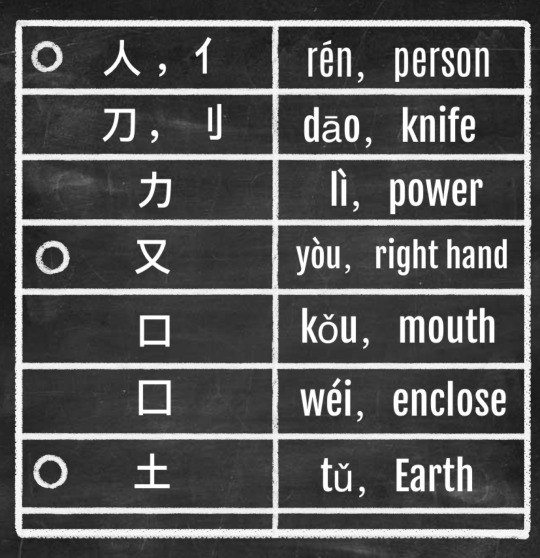
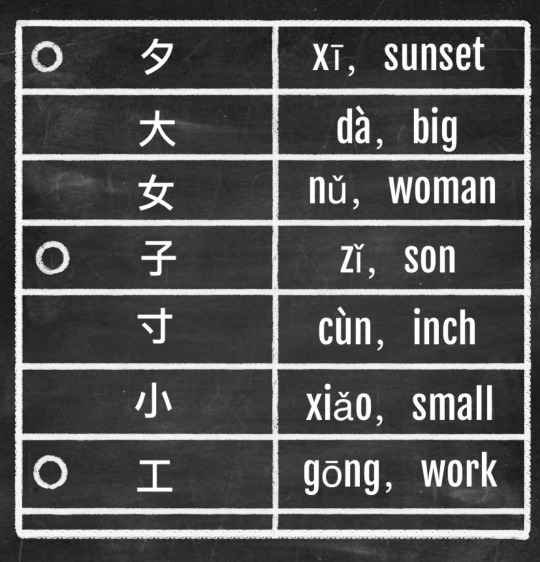
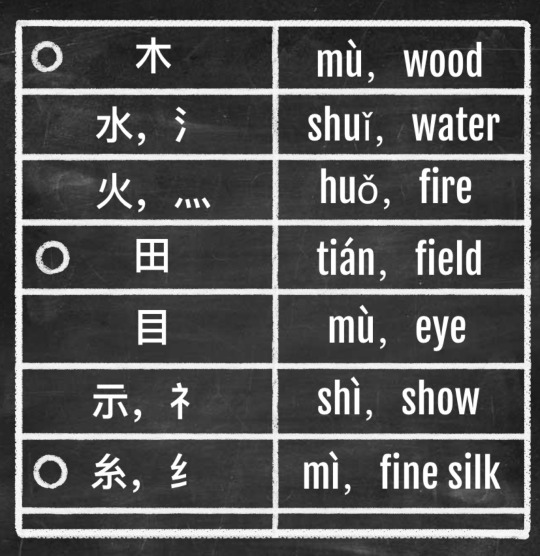
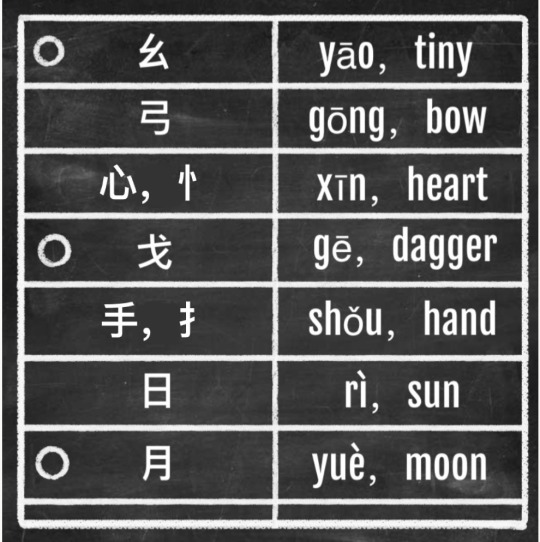
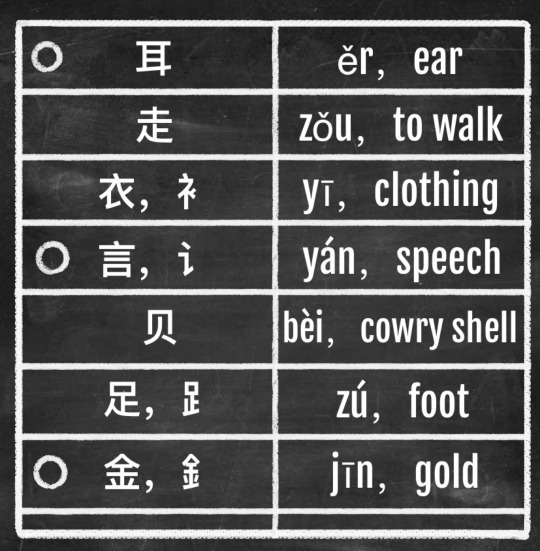
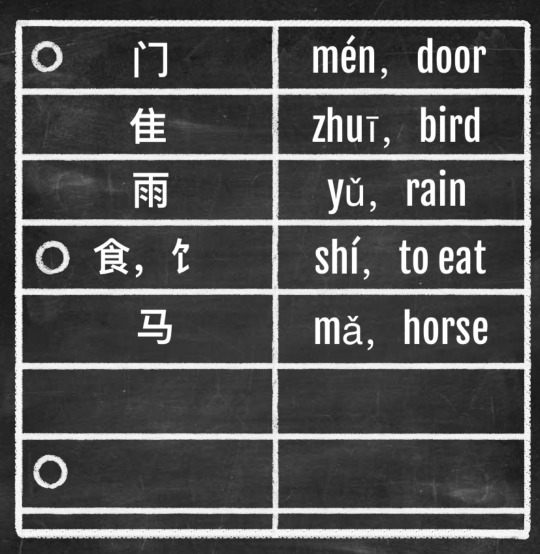
What are Radicals?
Radicals are the basically building blocks of Chinese characters. Either a character is a radical, or it has a radical in it.
There are currently 214 radicals, but this list of 40 will help you get started.
Radicals help separate and organize the characters. Chinese dictionaries organize each character under the radical that it uses.
Here’s how radicals work :
人 [rèn] is a basic radical. 人 means person, as we all hopefully know. Taking this radical and placing it into another character, that 人 will suddenly look like this: 亻。 This partial character cannot stand alone. Do you recognize it from somewhere?
That’s right! We see the ��� radical in 你, 们, and 他。There are more characters with this radical, but we’ll keep it simple for now.
You might also notice the the radical will sometimes relate directly with the character it’s in. That’s why they are separated in this way. It’s not always the case, but more times than not, you’ll see a pattern.
Radicals help learners guess at both meaning and sound. You might not know that 你 means you, but you see the person (人) radical and automatically connect them.
Predicting Sound comes a bit later. People fluent in Chinese can look at a character and usually guess at an unfamiliar character and not be so far off what it actually sounds like. As second language learners slowly grasp the language, they might also notice this. It’s because we see the character and connect it with a radical, or another similar character that may have a similar sound. Not tone, but sound.
All in all, radicals are incredibly important. Memorizing radicals should always be the first step in learning Mandarin because it just makes it so much easier.
MEMORIZE THESE BEFORE LEARNING OTHER WORDS. I kid you not, it’s so much easier to learn once you know what your looking at character-wise. It’s going to be boring but stick it out.
Below are some helpful things to look at or watch to help learn radicals quicker:
Click on any radical to see its definition, and characters that contain that radical: https://www.chinese-tools.com/tools/sinograms.html?r
Splits characters into what radicals they are made out of: http://zhongwen.com/
This is super long, but gives each radical, pinyin, translation-English AND Spanish, stroke order/number, and examples of the radical in other characters. Also, nice overall vibes in the background. https://m.youtube.com/watch?v=66hsy5cPyco
youtube
#radicals#these were the worst to learn#trust me I know#but it has to be done#zhongwen-lingblr#mandarin memes#aesthetic#studyblr#lingblr#chinese#mandarin#That Radical List#basic radical list#214 radicals#kmn#zhongwenlingblr#that language aesthetic
81 notes
·
View notes
Text
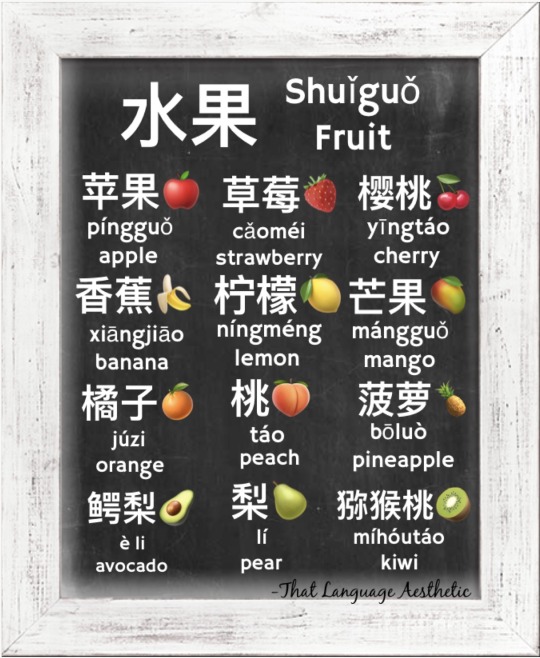
🍎“一日一苹果,医生远离我”🍏
#mandarin#learning languages#aesthetic#vocab#zhongwen-lingblr#learning language#lingblr#langblr#mandarin memes#that language aesthetic#languages#chinese#polyglot#yay#fruits#An apple a day keeps the doctor away#一日一苹果,医生远离我#🍎🍏🍎#vocabulary sheets#keep that doctor away#fucking chuck those apples if you have too#stay bealthy#dont kill doctors with apples
51 notes
·
View notes
Text

🐌 蜗牛 wōniú snail
看看蜗牛 kàn kàn wōniú Look at the Snail!
他真的可爱 tā zhēn de kě ài He is so cute!❤️
他的名字是方矮雯 tā de míngzì shì Fāng ǎiwén His name is Aiwen Fang 矮 means short lol
I call him Alfie in English❣️❣️
-That Language Aesthetic
• • •
That language Aesthetic is just generally excited about snails so we apologize in advance ...
Sorry for the short hiatus, coronavirus and personal travel have really affected the admin of this account -.- we’re doing our best to start posting again now that things have calmed down 👏👏
#language learning#duolingo#polyglot#that duolingo challenge#languages#chinese language#lingblr#langblr#mandarin#chinese#that language aesthetic#mandarin memes#zhongwen-lingblr
16 notes
·
View notes
Text
Word of the Day:
太 Tài Too
Put in front of an adjective to make it too much of something. Add “不太” to an adjective to make it not too much of something
Example :
太快 Tài kuài Too fast
不太慢 bú tài kuài Not too fast
#word of the day#chinese#mandarin#zhongwen-lingblr#studyblr#langblr#太#that duolingo challenge#duolingo challenge#lingblr#January6
8 notes
·
View notes
Text

That Tone P.S.A.
Tones are super important. One mistake can mean the difference the number four and death.
To learn tones, listen to people speaking Mandarin (movies, tv, music, etc.) , but also English.
English has tones, just like other languages, but aren’t used to differentiate between as many words as Chinese. When I think English tones, I think of two different types.
First, is tones within sentences. When asking an English question, the tone raises (like a second tone) to insinuate the question. When making a statement, the tone (in American English) goes down. (It goes up in British English, I am told). Learn to listen for these tones when you speak and it will help when learning Mandarin tones later on.
The second is more of a stressed tone. The difference between REcord and reCORD. These stresses play into the meaning of a word and how it changes with them in the same way that tones in Mandarin do.
买 and 卖 is a popular example of this. You might say “你买什么了?” [nǐ mǎi shénme le?] What did you buy? But if you use a Fourth tone instead, it would come out as 你卖什么了? What did you sell? — obviously not what you meant to say.
Best advice: overstress tones at first. Better to sound weird at first than to learn the words wrong
So be careful, practice listening and speaking, and avoid awkward conversations about the number 4 and death :-)
#language#polyglot#Tones#psa#mandarin#chinese#learning#languages#zhongwen-lingblr#That Language Aesthetic#awkward conversations#langblr#avoid number 4
5 notes
·
View notes
Text
Mandarin Memes ™
Is in the house 🤟

I hope they keep a lot of it the same though.
When the guardian summons the “dragon to protect the Fa family” no one shows up so it’s implied that Mulan is the Dragon.
Fa in Chinese is actually huā [花), and Mulan uses the fake name 花瓶 huā píng ... which means flower vase ... or slang for Camp Gay lol

你好 nǐhǎo Hello
Since it is two third tones put together, the second third tone (好) is shortened to more of a half Third Tone.

是 shì Is used to link nouns - is, are
How you should say it: 我很高兴。wǒ hěn gāoxìng. I am happy.
Have Batman slap you everytime you use the wrong helping verb。我很高兴😊

吗 ma Question particle
Also, a Third Tone with the same Chinese character gets you the word morphine. You know.... if you’re ever in the situation😂
Hope you all enjoyed!
Mandarin Memes ™
All memes belong to their respective owners. We do not claim ownership over any of the things we didn’t make. Thank you.
#mandarin memes#lingblr#zhongwen lingblr#studyblr#langblr#language learning#chinese langblr#mandarin#languages#memes#enjoy the memes#any questions? feel free to ask#memes are fun#learn that language#chinese#中文#汉语
165 notes
·
View notes
Text

量词 liàngcí Measure words
个 Ge Basic measure word
本 Běn Measure for books or files
碗 Wǎn Measure for bowls/cups
双 shuāng Measure for pairs of things
张 Zhāng Measure for flat objects
位 wèi Measure for people (honorific)
Notes
I’ve been told before that traditional Chinese does not use classifier words. Is this true? I don’t know. I tried googling it but I haven’t found anything to confirm or deny it. If anyone does know, please let me know :)
If you don’t know a measure word for a specific object (because I’m sure there’s hundreds lol) just use 个。
Times I would not depend on 个: 位。Don’t say 一个医生 because it’s disrespectful.... unless you mean to be rude. Then go right ahead
We’re sorry about not posting as often. As we navigate these strange times, we’ll try to provide more weekly content for your enjoyment.
-That Language Aesthetic in and ouT 🤟
#mandarin#chinese#language#languages#zhongwenlingblr#word of the day#中文#langblr#lingblr#That language aesthetic#measure words#zhongwen lingblr#mandarin memes
78 notes
·
View notes
Text
Mandarin Memes ™
Yo yo yo what up my peeps! I’m back with those hot dank memes y’all love so much
[there is only so much cringe a person can handle at one time ~the other admin on this account]

[ignores other admin] You heard right! No ridcously gendered inanimate objects in the house tonight! All we have is confusing pronouns with no difference in pronunciation. Can I get a whoop whoop?
他 tā He
她 tā She

Ah, thanks Drake for that wonderful meme👏👏 we’ll never get another like it.
So all those wonderful characters that Drakes given us are called measure words. In Chinese, to describe how much of something there is, a measure word is needed in between the number and the noun.
This isn’t a thing for traditional mandarin. In Taiwan, people don’t use measure words.
只 Zhī measure for animals, some utensils
条 Tiáo measure for pants, long things
双 Shuāng measure for shoes, pairs
辆 liàng measure for vehicles
张 zhāng measure for paper, flat objects
本 běn Measure for books, files
家 jiā Measure for family, business
个 Ge Measure for basically everything
The joke is that why use all these specific ones when you got 个?pfft, Idk either. Here’s some examples of measure words so I’ll pass the mic lollllllll
[admin step in to minimize the cringe]
三只猫 sān zhī māo Three cats
九本书 jiǔ běn shū Nine books
These could be replaced with 个, but it wouldn’t be all the way right? Like there would be a better way to say it if you said 【三个猫】. We’ll produce a more thrurough measure word sheet later.

So that’s that folks. This last one is truly my absolute favorite out of them all. I have never laughed so hard at anything in my life 😂
Have a nice day, y’all
Mandarin Memes ™ is out, Peace ✌️
#cringe#I am CringeLord#mandarin memes#language learning#studyblr#lingblr#langblr#zhongwen lingblr#chinese#that language aesthetic#mandarin#languages#chinese langblr#memes#dank memes#the cringe is real
142 notes
·
View notes
Text

⌚️ 时间 Shíjiān Time
Notes :
When putting this in a sentence, it wouldn’t go at the end like in English. It would go something like this :
我早上吃早饭。[wǒ zǎoshang chī zǎofàn] I eat breakfast in the morning.
Sentence structure :
Subject + time + verb / noun
This works for days as well. A while back I made a chart for days of the week, and months of the year so refer to that if your are struggling to understand
明天早上我吃早饭。[wǒ míngtiān zǎoshang chī zǎofàn] Tomorrow morning, I will eat breakfast
Sentence structure :
Time + subject + verb / noun
Different sentence structure, but essentially means the same thing. It’s a lot like the difference between “I ate breakfast in the morning” and “in the morning, I ate breakfast”.
This second structure tends to be easier for English speakers to understand because it has a very similar structure to English. I would encourage using both equally and not to rely too heavily on one or the other
Also, when telling time, you would go largest to smallest. So 明天 is tomorrow, which is the biggest time unit, and then down to what time of day [早上] and so on. The order is: Year, Month, Day, Time of day, Hour, Minute, Second
There are specific times that you can use the above time names. They aren’t set in stone, but best to follow this guide
凌晨 :~2am to ~5am
早上 :~6am to ~8am
上午 :~9am to ~11pm
中午 : ~12pm to ~1pm
下午 : ~2pm to ~5pm
晚上 :~6pm to ~11pm
半夜 :~12am to ~1am
Again, I must stress. ROUGH estimates. It’s hard to explain. It’s like, you wouldn’t go to school at 【上午】 even though an English translation says that 上午 means morning. You would go to school at 【早上】。6ish to 8ish isn’t really “early morning” but English translations can be misleading because of this
#languages#learning#chinese#mandarin#language learning#lingblr#chinese langblr#language blog#sentence structure#times of the day#December26#中文#zhongwen lingblr
317 notes
·
View notes
Text
Introducing :
Mandarin Memes
Because who doesn’t like a dank meme with their language studies

Vocab
买单 mǎidān Check / Bill
服务员 Fúwùyuán Waiter / waitress

Vocab
我的眼 wǒde yǎn My eyes
书 shū Book
书上的字 Shūshàng dezì word ⚠️
我的脑子 wǒde nǎozi My brain
知识 Zhīshi Knowledge
Notes :
Zhongwen-lingblr informs me that this is a bit weird. Another word for the word “word” could be a little less awkward by using 词 [cì - word].

Hope you’ve enjoyed my first post. I’ll include an English one here and there so ya. Zhongwen-lingblr and That language aesthetic are jelly cuz they didn’t think of this awesome idea.
Enjoy dem dank memes!
#chinese langblr#中文#zhongwen lingblr#Mandarin memes#chinese#mandarin#learning language#that duolingo challenge#duolingo#studyblr#enjoy these memes while you can#i have scoured the internet#far and wide#to bring this hand crafted content#just kidding it was five minute google searches
125 notes
·
View notes
Text
Mandarin Memes
My tag in cursive is my new Entrance™

Vocab :
某人 Mǒurén Someone
说 Shuō To speak
中文 Zhōngwén Chinese
太快 Tàikuài Too fast
我不知道 Wǒ bù zhīdào I don’t know
什么 Shénme What
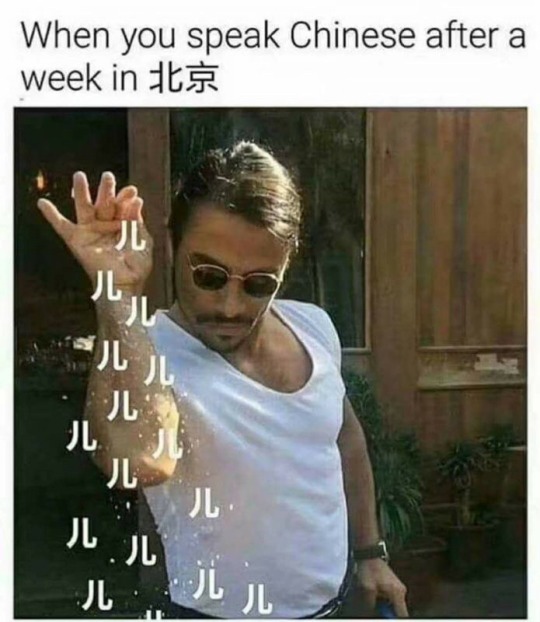
Vocab :
北京 Běijīng Beijing City (the North City)
儿 Er Retroflex
How to say the English Part :
什么时候你说中文在北京 *roughly* Shénme shíhòu nǐ shuō zhōngwén zài běijīng When you speak Chinese in Beijing Usually means : “when do you speak Chinese in Beijing?” But for the sake of the meme...
This joke is particularly funny because a Beijing accent sticks these retroflexes everywhere. 儿 is everywhere when they speak
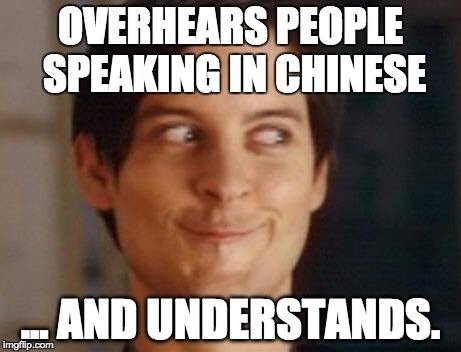
An English one for y’all to enjoy cuz I’m good like that.
Stating this once and only once for the people in the back : we take no credit for any of the memes unless our watermark is placed at the bottom. Those without watermarks belong to their respective owners and I’m too fucking lazy to look up and credit every meme maker but we thank them for their service anyway.
~Mandarin Memes
That’s my Exit™
#mandarin memes#mandarin#chinese#studyblr#lingblr#langblr#zhongwen lingblr#learn that mandarin#that duolingo challenge#duolingo#memes#them dank memes#memes in another language
110 notes
·
View notes
Text




Weather vocabulary
Left:Simplified version
Right:Traditional version
#studying languages#lingblr#learning chinese#learn languages#learn chinese#langblog#langblr#languages#learning languages#studying#study#studygram#study notes#students#studyblr#xuexi hanyu#hsk#hanyu#zhongwen#studying chinese#mandarin chinese#mandarin#vocabulary#words#idioms#chinese idioms#chinese vocabulary#simplified#traditional#wikvocabulary
52 notes
·
View notes
Text

The adverb 都 (dōu) is used to express "all" in Chinese. It's common to use 都 (dōu) in a variety of sentences where it would seem unnecessary in English.
Remember that 都 (dōu) appears after the subject. A common mistake learners make is to put 都 (dōu) at the beginning of the sentence (as "all" often appears there in English). This isn't good Chinese - make sure you put 都 (dōu) after the subject and before the verb.
Structure: Subj. + 都 + [Verb Phrase]
Examples:

Since it is an adverb, 也 (yě) is inserted after the subject, before the verb or verb phrase.
Structure: Subj. + 也 + Verb / [Verb Phrase]
Examples:

In Chinese, regardless of whether the sentence is positive ("I like them too") or negative ("I don't like them either"), 也 (yě) is used the same way. Just make sure you put the 也 (yě) before the 不 (bù) or other negative part that comes before the verb.
也 (yě) with Adjectives:
也 (yě) can also be used with adjectives. Remember that for simple "noun + adjective" sentences you normally need to include an adverb like 很 (hěn) before the adjective. In that case, just put the 也 (yě) before the adverb.
Structure: Subj. + 也 (+ Adv.) + Adj.
#mandarin chinese#mandarin#xuexi hanyu#hanyu#studying languages#studying#study#studygram#studyblr#study notes#students#lingblr#learning chinese#learn languages#learn chinese#langblog#langblr#languages#learning languages#zhongwen#hsk#studying chinese#wikgrammar
48 notes
·
View notes